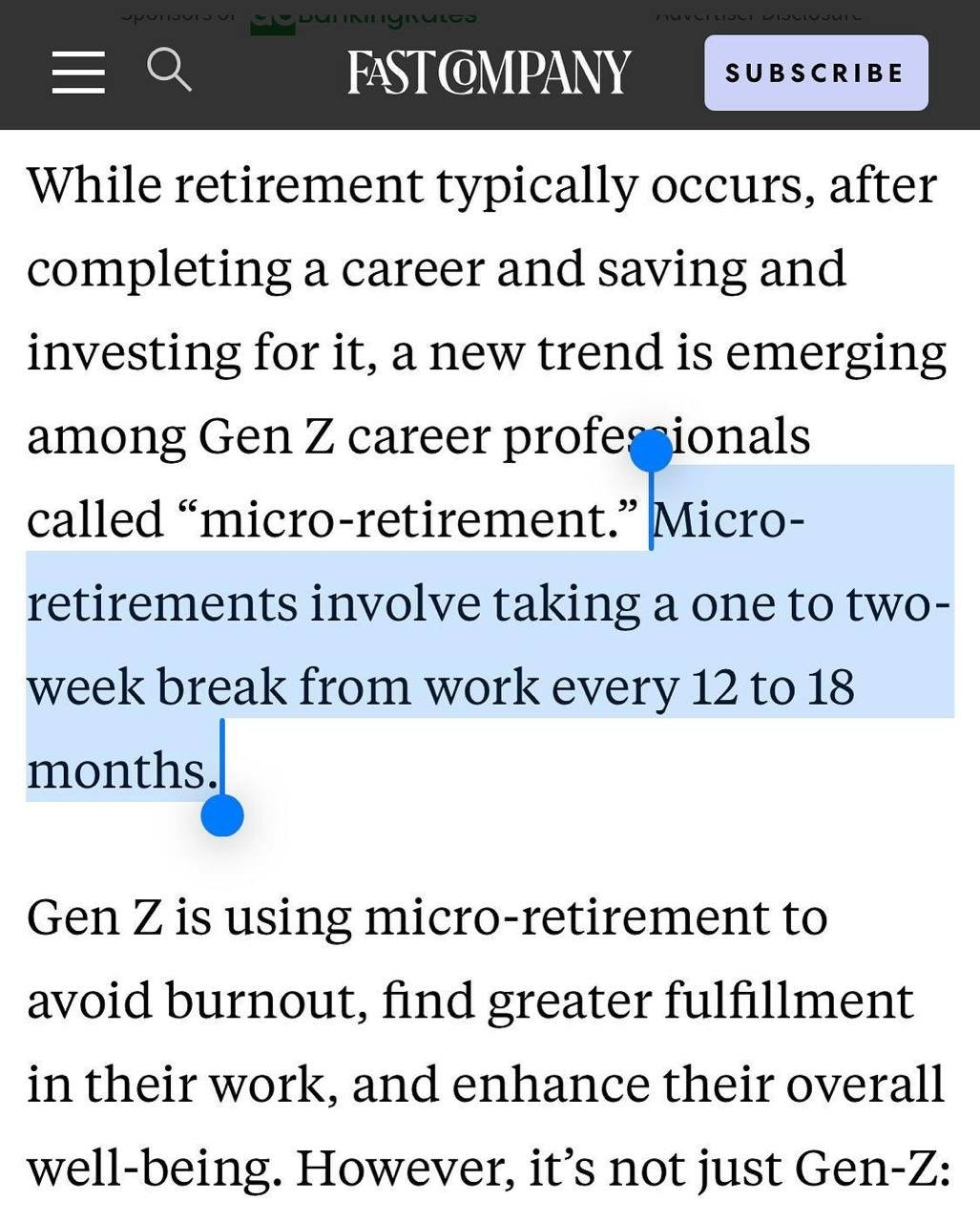Robert Dresden
- 114 Followers
- 181 Following
- 1,075 Posts
The 'Bluesky Is Over' party is beginning over on the platform.
The 'Bluesky Is Over' party is beginning over on the platform.

I’m in Sweden. About ⅔ of the office is micro-retired for the next month or so. (The consensus-minded Swedes do like taking July and/or the first half of August off.) I’m not, but I did a 1½-week micro-retirement in March, and have a shorter one coming up later this summer. Last year, I took most of a month (so, a mini-retirement) to go to Australia.
Framing a week every 1-2 years as a “micro-retirement” sounds like giving the Overton window a further push to normalising servitude.
@avuko @Wifiwits @cdamian @acb @simon_lepuissant @dacig
Not sure about scale, but I'm a big proponent of working thirty six hour-weeks in a year. I think if you are working one hour every week, you will need sixteen weeks micro-retirement a year.
This 16 weeks should include any public micro-retirements. To have those days in addition would be ridiculous.
@NovaNaturalist
This saves us from burning out very much indeed
Before taking full time retirement, my collective agreement gave me six week micro-retirements every year. That started at 25 years of employment with the same organisation. In my first year I only had three weeks a year.
And the three weeks to start was through the union, which also provided 15 days per year paid sick leave and two days additional paid Personal and Volunteer leave.
It’s no surprise that many European countries top the lists of the happiest places in the world.
It shouldn’t take unions to ensure proper holiday breaks for workers.
@mike @Sanderde @acb Sorry if I have misunderstood you, but there is nothing "entitled" about recharging your batteries. What is entitled is the expectation from some employers that they can work you without recharging your batteries.
Getting sufficient vacation, like securing the 40 hour / 5 day week is a key success of the labour movement, but there is more work to be done. Canadians are entitled to use Europe as our model and not the US.
@NovaNaturalist @mike @Sanderde @acb
Quite so: thinking that ridiculously small holiday entitlement is somehow a hard fact of life is pure Stockholm syndrome.
(Lest I'm given the hair shirt of entitlement to wear in shame, I worked in just such a field for years, where the dial for assistants was set firmly at Masochist. About halfway through, I went freelance and took mahoosive holidays - up to six months - until I decided to stop being on call altogether and switched jobs. I have a low opinion of the argument that it's a necessary reality to do this. Horseshit.)
@jblake @mike @Sanderde @NovaNaturalist @acb
I think we are feeding the AI monster with micro-retirement vibe. Its called a vacation.
Although I get a chuckle out the micro, nano, pico series of replays:-) well done.
“Micro-retirements offer an opportunity to recharge. Gabrielle Siegel, a wealth management advisor at Northwestern Mutual, notes that this is valuable. ‘It’s taking time to focus on what’s bringing you the most happiness, recharging, mentally avoiding burnout, and realigning with your personal goals. Gen Z is looking at the workplace a bit differently, and happiness is an important factor,’ she says.”
https://www.fastcompany.com/91357784/what-is-a-micro-retirement-inside-the-latest-gen-z-trend
Seems legit.
With my union, unused annual sick days were carried over (I retired with 275). If used up, insurance paid 70% if you’re unable to work or be reassigned, with medical certification.
In Canada the federal government sets the working standards for federally regulated companies, ie banks. The provinces are responsible for their own regulations.
One fairly recent addition is shared paid maternity/paternity leave for one year, or 18 months on reduced pay.
Federal government, with dozens of bargaining units. Usually when one negotiates a nice benefit, the rest tag along on their next contracts.
One useful benefit was converting overtime into time off in lieu which I used a lot (they can’t tax time off). That had to be used up each year or paid out, but the regular vacation leave could be carried over year after year.
Some companies require the PTO must be used or it’s lost. The Executives in the federal government had that where it had to be used by the end of the fiscal year (Q4) which resulted in many taking it just as the next year’s budgets were being drawn up. 🤦🏻♂️
The German way of making it in Q1 makes much more sense, like so many things do.
@schrotthaufen
"and you _have_ to take two consecutive weeks off at least once per year. (This is law.)" - I don't think this is the case. Emplooyees don't have to take two consecutive weeks off once a year, but employers have to give them the opportunity to do that, so it's a right for the employees and an obligation for the employers.
@schrotthaufen @Sanderde @NovaNaturalist @acb
"Then that must have changed at some time in the last 10 or 15 years." - hm, the law became effective in 1963, and §7 (2) BUrlG was not changed, as far as I can find out. Anyway, maybe they hadn't paid much attention and then someone reminded their legal or HR department of §7 (2) and they adapted in a hurry.
